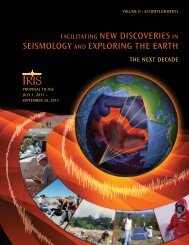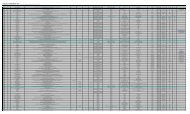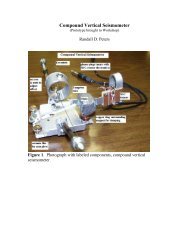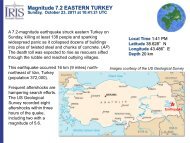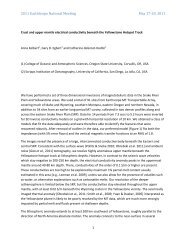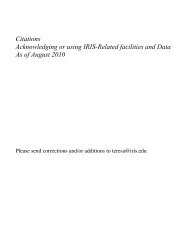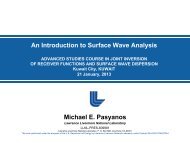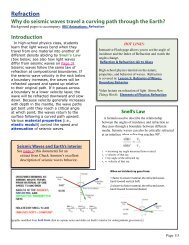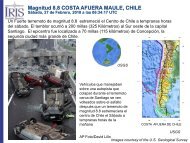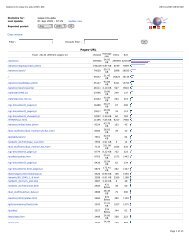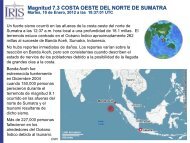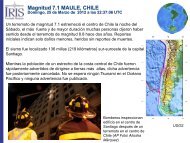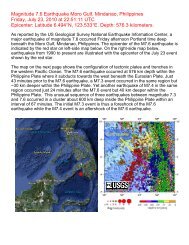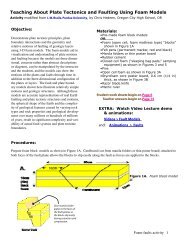Download 9.3 Mb pdf - IRIS
Download 9.3 Mb pdf - IRIS
Download 9.3 Mb pdf - IRIS
You also want an ePaper? Increase the reach of your titles
YUMPU automatically turns print PDFs into web optimized ePapers that Google loves.
Appendix B<br />
Policy for the Use of PASSCAL Instruments<br />
September 12, 2006<br />
Introduction<br />
Portable field recording equipment and field computers<br />
purchased by the PASSCAL Program are available to any<br />
research or educational institution to use for research<br />
purposes within the guidelines established in this document.<br />
The intent of these guidelines is to establish the procedures<br />
to enable investigators to request the instruments, to let<br />
them know what requirements and responsibilities are<br />
incurred in borrowing the equipment and to know when and<br />
how the decisions on instrument allocation will be made.<br />
support which is provided. Only through your continued<br />
support and feedback will <strong>IRIS</strong> be able to develop and<br />
expand the services it provides for seismological research.<br />
PASSCAL publishes an inventory of all of its equipment<br />
through the <strong>IRIS</strong> World Wide Web site (http://www.iris.<br />
edu). This inventory includes all data loggers, sensors, field<br />
computers and major ancillary equipment. A description<br />
of the capabilities of the various pieces of equipment are<br />
available with the inventory as well as a copy of the current<br />
instrument schedule.<br />
The efficient use of the instruments will require close<br />
cooperation among all of the parties involved. The Principal<br />
Investigator is encouraged to contact the PASSCAL Program<br />
Manager about any planned experiment during the proposal<br />
development stage in order to determine if there are any<br />
problems in operating the equipment in the environment<br />
called for in the experiment. It is also important for everyone<br />
to know of possible schedule conflicts as early as possible.<br />
Open communications will allow the development of alternative<br />
plans early in the scheduling process.<br />
The PASSCAL instrumentation and associated services<br />
are provided, without charge, as part of the facility<br />
support developed by <strong>IRIS</strong> through funding from the<br />
Instrumentation and Facilities Program, Earth Sciences<br />
Division, National Science Foundation, with additional<br />
equipment provided through the Air Force Office of<br />
Scientific Research, the Office of Nonproliferation Research<br />
& Engineering of the Department of Energy and the Office<br />
of Basic Energy Sciences of the Department of Energy. As a<br />
community resource, <strong>IRIS</strong> and NSF rely on the individual<br />
PIs to conform to a limited number of rules and conditions<br />
related to the use of PASSCAL instruments, to treat the<br />
instruments with care and respect, and to acknowledge the<br />
Procedure for<br />
Borrowing Instruments<br />
Any research or educational institution may request the<br />
use of the equipment for experiments of scientific merit.<br />
The initial request will be submitted to the <strong>IRIS</strong> via the<br />
Worldwide Web using:<br />
• http://www.iris.edu<br />
The initial request should be sent to <strong>IRIS</strong> at the time the<br />
proposal is sent to the funding agency.<br />
Each request will as a minimum contain the following<br />
information:<br />
1. A short description of the experiment to be conducted;<br />
including any unusual field conditions which may be<br />
encountered;<br />
2. The location of the experiment (latitude - longitude as<br />
well as an estimate of the aerial extent);<br />
3. Starting and ending dates of the experiment along with<br />
information on any extenuating circumstances which may<br />
make it impossible to slide the date forward or backward;<br />
54



